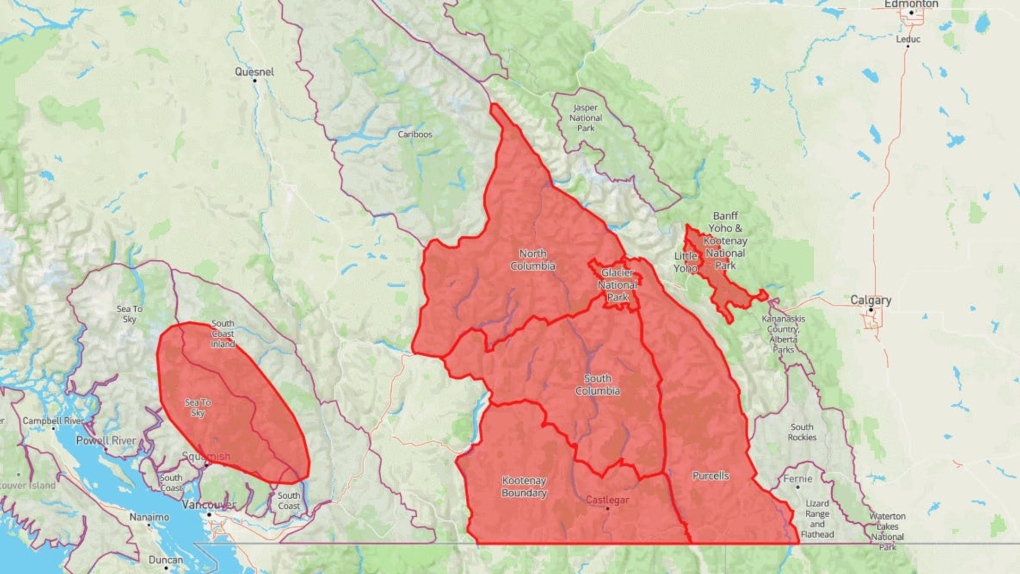Avalanche danger warning issued for B.C. and Alberta backcountry users
 A special avalanche warning has been posted for recreational backcountry users in several regions of B.C. and Alberta as warm temperatures make the snowpack unstable. (Avalanche Canada)
A special avalanche warning has been posted for recreational backcountry users in several regions of B.C. and Alberta as warm temperatures make the snowpack unstable. (Avalanche Canada)
A special avalanche warning has been posted for recreational backcountry users in several regions of B.C. and Alberta as warm temperatures make the snowpack unstable.
Avalanche Canada and Parks Canada have issued the advisory to take effect immediately and last through to Monday.
The warning applies to the North and South Columbias, Purcells, Kootenay Boundary, and Glacier, Banff, Yoho and Kootenay National Parks.
It also applies to B.C.'s Sea-to-Sky region and South Coast Inland area from Squamish to Pemberton.
James Floyer, the forecasting program supervisor for Avalanche Canada, says there are weak layers in the mountain snowpack across most of southern B.C. and western Alberta.
He says the combination of the snowpack structure, sunshine and higher temperatures will make natural and human-triggered avalanches much more likely.
The forecasting agency says there have been several close calls reported recently including one last weekend in southeastern B.C. where a large avalanche buried all but the head of a snowmobiler and his companions were able to dig him out alive.
“There is a lot of uncertainty with these weak layers,” says Floyer. “While we have targeted an area where we think there is a higher risk of triggering these deep weak layers, we also urge backcountry users in adjacent regions to exercise caution during this warming period.”
This report by The Canadian Press was first published Jan. 20, 2022.
CTVNews.ca Top Stories

B.C. tenants evicted for landlord's use after refusing large rent increase to take over neighbouring suite
Ashley Dickey and her mother rented part of the same Coquitlam duplex in three different decades under three different landlords.
MPP Sarah Jama asked to leave Ontario legislature for wearing keffiyeh
MPP Sarah Jama was asked to leave the Legislative Assembly of Ontario by House Speaker Ted Arnott on Thursday for wearing a keffiyeh, a garment which has been banned at Queen’s Park.
Mountain guide dies after falling into a crevasse in Banff National Park
A man who fell into a crevasse while leading a backcountry ski group deep in the Canadian Rockies has died.
Body of Quebec man who died in Cuba found in Russia, family confirms
A Montreal-area family confirmed to CTV News that the body of their loved one who died while on vacation in Cuba is being repatriated to Canada after it was mistakenly sent to Russia.
Expert warns of food consumption habits amid rising prices
A new survey by Dalhousie University's Agri-Food Analytics Lab asked Canadians about their food consumption habits amid rising prices.
Saskatchewan isn't remitting the carbon tax on home heating. Why isn't my province following suit?
After Prime Minister Justin Trudeau said the federal government would still send Canada Carbon Rebate cheques to Saskatchewan residents, despite Saskatchewan Premier Scott Moe's decision to stop collecting the carbon tax on natural gas or home heating, questions were raised about whether other provinces would follow suit. CTV News reached out across the country and here's what we found out.
Montreal actress calls Weinstein ruling 'discouraging' but not surprising
A Montreal actress, who has previously detailed incidents she had with disgraced Hollywood producer Harvey Weinstein, says a New York Court of Appeals decision overturning his 2020 rape conviction is 'discouraging' but not surprising.
Charlie Woods, son of Tiger, shoots 81 in U.S. Open qualifier
Charlie Woods failed to advance in a U.S. Open local qualifying event Thursday, shooting a 9-over 81 at Legacy Golf & Tennis Club.
RCMP officers had no legal authority to enter man's home, make arrest: B.C. court
A B.C. man has been found not guilty of assaulting two RCMP officers – with the court finding he was resisting an "unlawful entry and arrest" in his home before he was tasered, taken down and hauled away in handcuffs.
































